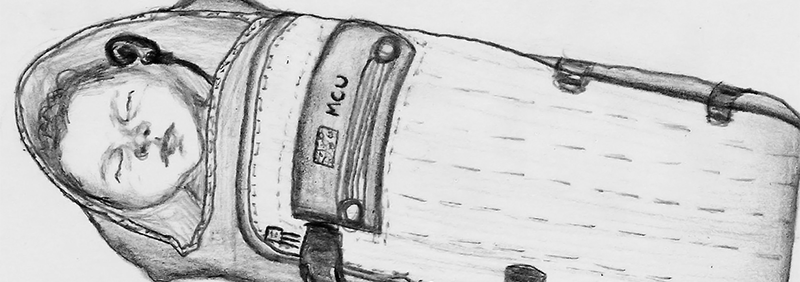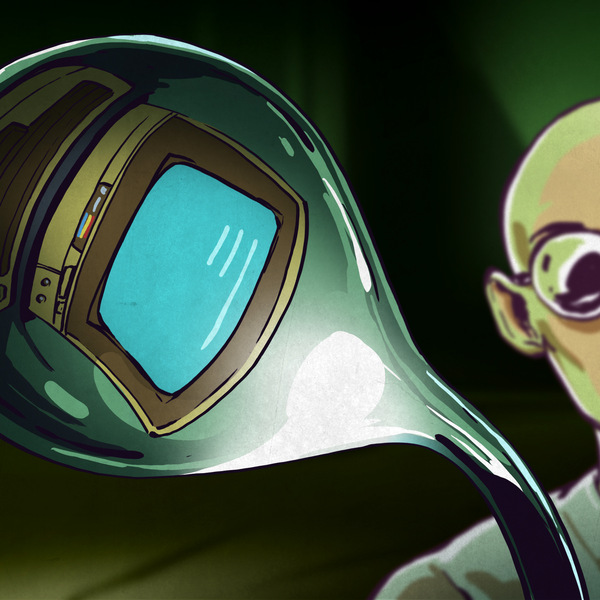Millions of premature babies are born every year, and more than a few of these births occur hours away from any hospital with a NICU. [Manoj]’s entry for the Hackaday Prize is a simple, but very useful primitive incubator. Is it as good as the incubators you would find in a world-class hospital? No, but that’s not the point. This is an incubator for the rest of the world, where neonatal care is lacking.
You’re not going to get mechanical respiration or even oxygen into a device that is meant for the most far-flung areas on the planet, so this incubator focuses almost solely on monitoring. Packed inside a premie-sized sleeping bag is enough electronics to measure heart rate, blood oxygen, temperature and respiration. Also, there are a few resistive fabric elements to turn electricity into warmth.
Of course, anything you would find in any hospital or clinic would greatly outclass what this project has to offer. That’s really not the point, though; this incubator is cheap, can be deployed anywhere, and provides enough information to hopefully keep a preterm child alive. That’s good enough for us, and makes for a great entry into the Hackaday Prize.




















I always knew babies are portable, and effective incubators for all kind of odd pathogens, but cheap? Come on, they cost a fortune to keep running.
I may be in desperate need for sleep, however.
Had I known there was a need I wouldn’t have thrown out my old microwaves.
ehhh…..
Medical electronics….
Anyone do an FMEA on it yet?
The problem here is the risk of killing babies due to unforeseen consequences. Ray Avery in New Zealand has been working on this problem for years. He has written a fascinating book about his colorful and sucessful like, and goes into the lifepod design process a bit too. thelifepod.co.nz
Great idea, but i don’t think that developing countries will be interested in something that is only half-solution. It lacks functions that are needed to take care of premature infants, which is actually the biggest problem in developing countries. I’d suggest reading Wikipedia on the subject: http://en.wikipedia.org/wiki/Neonatal_intensive_care_unit
Badly designed incubator cost me my eye because it was capable of delivering either normal air or pure oxygen. Pure oxygen kept me alive, but it destroyed my left eye and damaged right one. And there are many people like me in Poland, just because incubators we had back then were cheapest possible models…
no, the biggest problem is the overpopulation (https://en.wikipedia.org/wiki/Human_overpopulation)
Overpopulation rhetoric is entirely dependent on a status quo which denies their populations resources.
Still better then nothing but indeed it’s unsefe to use NICU like this, it’s need more develop to be much more safety.
How about a half-solution is better than none? I’ve read the project logs and watched the video, and this is a very good and affordable solution to a real problem. Read the part about dangerous methods of keeping premature babies warm. They have not only researched the need for this, but have had the help of actual doctors working in the field in rural India.
Do you know why it is called an incubator? The first ones were designed just to keep the baby warm. I was a premi in Colombo, Ceylon in 1950. I spent 2 weeks in a then standard incubator which just kept me warm. You may have had an unfortunate experience, but like mine it is only of historical interest. So while I don’t intend to belittle you, I think you should applaud these guys, find out in detail what they are doing, and if you have something positive to help them with, tell them directly rather that coming here and saying “its not good enough”.
The doctor who inspired us to solve this issue told us how horrid the current situation actually is. Yes features in a medical grade NICU are lacking here but compared to keeping an incandescent bulb near the baby (which has resulted in severe burns) access to any incubator at all is a question mark in those areas. The existing incubator have been out of reach for them for decades now.
IMO, you’ve got to prove, that in the absence of more advanced medical facilities, that it’s more effective than this… https://en.wikipedia.org/wiki/Kangaroo_care
If you had read their project log and watched the video, I think you would find that they have done their homework really well.
Thanks for the compliment Sid, It means a lot. RW we still indeed have a lot to prove. We see our device as a step up from existing solutions. This project cost the last of my parent’s project allowance and we are waiting for our semifinalist prize money to arrive to make our design more effective. We have also applied to various Hardware Incubators to hopefully continue the development.
But being connected to dx telemetry is pretty much always going to have a better result than not being connected to it. Heck, I’d use this on athletes too. Have you tried jogging in it?
3rd world clinics can be less impressive than you may think. Often it consists of whatever the doctor can carry himself. This is why you hear of specialised programs for just a specific need such as removing eye cataracts or treating specific diseases. Rarely a heart rate monitor to be seen. This project has more legs than it is being given credit for.
Thanks for your kind words, Robert. Our work is still going. We are aiming to start development of our future revisions soon.
My grandfather told me once of a cousin, I think, who was born premature when he was a kid, this is like a century ago, so the kids grandmother put the kind in the wood stove on low (with the door open of course) for a week to keep it warm and it gained enough strength to survive, so maybe “primitive” people aren’t so stupid.
We never implied they were “stupid” in anyway. I was brought up in rural part of Tamilnadu, India. I know first hand how ingenious “primitive” people are and we Indians pride ourselves with our jugaad.
Your argument however is similar to asking why we use prescription medicines instead of collection of medicinal herbs.
A century back we barely had proper surgery let alone NICU’s, Today however we have an ability to do way better and that is exactly what me and my team are trying.
Babies are indeed effective incubators for all kinds of pathogens. How do you keep this clean?
http://embraceglobal.org/
Is this project different?
Hi, We have clearly stated our distinctions from the Embrace project in our description.
Embrace was a great source of inspiration and we added diagnostic functionality in ours which is lacking in the Embrace one. Second the thermal element is at a fixed temperature in Embrace and this is a problem in areas like Nepal where ambient temperature is very low.
Looking a bit similar to this infant warming system by Warmilu, theirs is much cheaper, and less complicated:
http://warmilu.com/infant-warming-solutions/
This is quite an inspired idea, with a lot of potential. Much of the science/ tech is beyond me. I truly hope this concept works and is put into practice; it would mean a lot to those who live in rural, and out of the way areas (not near properly kitted out hospitals with the more sophisticated incubators)